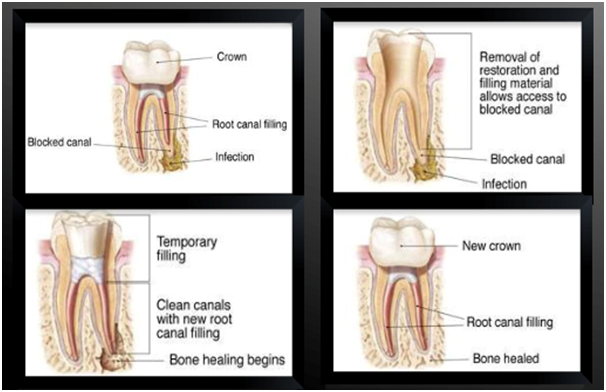If you have a tooth ache or require root canal therapy in Melbourne, please contact us for a consultation at Unity Dental. We accept emergencies every day. Our dentists will listen to your symptoms and answer any questions. Our dental team will examine your teeth, which may include taking x-rays to help plan a customised approach for your root canal treatment by revealing the number, size and curvature and depth of the roots. This will help to determine the complexity of your case.
Root Canal Treatment in Melbourne

All About The Root Canal Procedure
- 1. done in ONE VISIT with
- 2. NO PAIN
Did you ever think that root canal treatment could be:
Root canal treatment can take several appointments, depending on how complex your tooth is. Teeth may vary in shape depending on the number, length and curvature of the root canals. Sedative dressings and temporary fillings may be placed inside your tooth between each visit to help settle the surrounding tissues and destroy remaining bacteria. In between visits you can use your tooth for chewing, but some care should be exercised.
During the root canal treatment your tooth will be isolated and protected with a sheet of rubber (“rubber dam”). The rubber dam isolates the tooth, so only the tooth can be seen during the root canal treatment. This prevents debris from within the tooth entering the mouth, or saliva and bacteria from the mouth entering the tooth during the root canal treatment process. A metal band may also be placed around your tooth, to protect the tooth and help retain the temporary filling. This band remains in place until the crown of the tooth is restored at the final appointment along with the root canal filling.

Why are X-Rays taken during root canal treatment?
It is necessary to take a number of radiographs (commonly called x-rays) during the root canal treatment – these are required to check various treatment stages. Since the roots are under the gum and in bone, the root canals cannot be seen with the naked eye and can only be visualised using the assistance of radiographs.
Will there be any Pain?
Root canal treatment is a comfortable procedure and it involves no pain as the tooth will be anaesthetised with local anaesthetic during treatment. However, sometimes you may have discomfort after an appointment due to inflammation in the surrounding tissues – this is usually relieved by the dressing that your dentist puts in your tooth. Sometimes a mild analgesic may be required. If you experience severe pain, or if your discomfort lasts for more than several days, then you should call us for advice.
Success of Treatment
Your tooth will only be treated if there is a good chance it will last a long time.
However, no guarantee can be given – because people have varied healing responses and some infections may respond differently. Studies have shown the majority of endodontic treatments are successful and uneventful. If your case is considered less favourable, then you will be informed. Healing of the jaw bone around the tooth can be slow and it is important to have your tooth reviewed regularly to assess healing. You will be recalled for these checks. Rarely, additional treatment in the form of an endodontic surgical procedure may be required to aid the healing of the tissues around the tooth
After root canal Treatment
When root canal treatment has been completed, a filling or crown (cap) may be necessary. This will restore your tooth to its original shape and function. The tooth should be restored properly as soon as possible as there is a risk of damage to the tooth from biting forces. Following root canal treatment you must look after your tooth, as you do your other teeth, as root canal treated teeth may still get decay or gum disease.
Is there an alternative to Root canal treatment?
Root canal treatment is a safe procedure. There is no real substitute for your own tooth. It is far more efficient in chewing and biting than an artificial tooth. Root canal treatment is undertaken to save your tooth. The only alternative method of removing the infection is to extract your tooth. If you do not have the tooth replaced with an artificial one, the adjoining teeth may shift, interfering with biting and chewing. Loss of a tooth may also lead to other complex problems including gum disease, decay of other teeth, jaw joint and jaw muscle problems. Replacing your tooth with an artificial tooth often involves more involves more complex treatment such as bridgework or implants.
Case Study
Root canal treatment has allowed healing and regression of this painful infection over a 6 month period post treatment.
